英语一般现在时与现在进行时趣味口语活动——飞行棋
小升初英语一般现在时-现在进行时-冠词习题

小升初英语一般现在时-现在进行时-冠词习题一、一般现在时构成。
1.主系表结构(含有be 动词):肯定句:否定句:一般疑问句:否定回答:肯定回答:2.主谓宾结构(含有实意动词):肯定句:否定句:一般疑问句:否定回答:肯定回答:二.现在进行时构成。
肯定句:否定句:一般疑问句:肯定回答:否定回答:1.We see a film once a month.2.Tom and Tim play basketball on the playground.3.They are lovely.4.My mother cleans the floor every day.3.I do my homework every day.4.H e speaks English very well.5.M y grandpa likes going fishing.1.I like taking photos in the park .3.Tom and Tim play basketball on the playground .1.I clean the floor in the room every day.2.W e see a film once a month.3.B illy does his homework in the classroom.1.I go to the park in the morning.2.We take a walk every evening.5.Tom often plays football on Sundays.6.T om and Tim play basketball on the playground.( 改一般疑问句)王式教育小升初英语Name:一.写出下列名词的复数形式:Score: _1、sheep 6、6.child 11、toy2、class7、shelf12、foot3、text8、bed13、Japanese4、monkey9、boy14、radio5、piano10、family15、photo16、family 17、tomato 18、fox 19、woman 20、knife二、写出下列动词的现在分词:play run swim make go e put see buy live stop sit begin stay三、选择填空:( ) 1、There on the wall .They are very beautiful.A. are photoesB. are photosC. is a photoD. is photos( ) 2. there a radio on your desk? A. are B. is C. am( ) 3. There are four and two in the group.A. Japanese, Germen B Japaneses, Germen C. Japanese, German D. Japanese, Germans ( ) 4. That's art book. A. anB. aC. theD. are( ) 5. Water a kind of matter.A.is B.are C. Am( ) 6. Are there pictures on the wall? No, there aren't .A.any / any B.some / any C. some / some( ) 7. Who the kite now? A .flies B. fly C.is flying( ) 8. The Greens supper now. A:is having B:are;having C:is haveing( ) 9. Tina has a new schoolbag , she looks so . A. happy B. long C. funny D. Good ( ) 10. Please pass themA. two cups of teaB. two cup of teaC. two cups of teasD.two cup of teas( )11.( )12. There is sun is shining brightly. A. A B. An C. The D. / “h”in the word“hour”. A. a B. the C. an D./( )13. She is now. A. Watch TV B. watching TV C. watches TV D./四、用括号内词的适当形式填空:1.There are t w o over there.(bench)2.H elen often (go) to school by bike.3.There i s a red (tomato) on the table.4. There are t w o boxe s of on the floor.(apple)5.Listen , Some girls ( sing)in the classroom .6.My mother ( cook )some nice food now.7.Look . They ( have) an English lesson五、用a/an 填空:1.Is there umbrella on the desk?2.There is island in the sea.3.There is picture on the card.4.I have old book.5. apple is a kind of fruit.6.There is armchair in the living room.7.I'd like egg. 8.Look, there is bird in the tree.9.I s there map on the wall? 10.There is bench in the park.六、句型转换:1.They are doing housework .(改成否定句和一般疑问句)2.The students are cleaning the classroom . ( 改一般疑问句,并作肯定和否定回答)3.I’m playing football in the playground .(对划线部分进行提问)4.They are reading in the classroom. (对划线部分进行提问)1.T om and Tim play basketball on the playground.2.I do my homework everyday.3.H e speaks English verywell.4.T om and Tim play basketball on the playground . 5I clean the floor in the room every day.6.T om often plays football on Sundays.7.W e see a film once a month.8.M y father went to work by bus.9.I had 20 books last year.10.The dress is 50 dollars.11.Amy has been in China for eight years.一、看字写拼音(你能写正确吗?)嗡()朗润()酝酿() 卖弄 ()喉咙()应和()嘹亮() 烘托 ()静默()风筝()抖擞() 健壮 ()呼朋引伴( ) 花枝招展( ) 镶( )单单( )安适( )着落( ) 慈善( )肌肤( ) 秀气( )宽敞( )空灵( )贮蓄( ) 澄清( ) 地毯( ) 蝉( )花苞( )娇媚( )彩棱镜( )粗犷( ) 睫毛( )衣裳( )铃铛( ) 端庄( )静谧( ) 屋檐( ) 凄冷( )化妆( ) 莅临( )造访( ) 吝啬( ) 淅沥( )干涩( )草垛( ) 绿茵茵( ) 咄咄逼人( )二、看拼音写汉字(他们可是很难的哦!挑战一下吧)tān huàn bào nùchén jìshìnòng chuídǎ( ) ( ) ( ) ( ) ( )qiáo cuìyāng qiúxùdāo juébiédàn yǎ( ) ( ) ( ) ( ) ( )gāo jiélàn màn fān lái fùqùxǐ chū wàng wài ( ) ( ) ( ) ( ) xìn fúfēn qíqǔjuéyīshàliǎng quán ( ) ( ) ) ) ) lín lín gèdéqísuǒdìgěn nì xiào mùdǎo gào zǐmèi(tíng )páihuá)zhē bì)xīn) )liúzhuǎn yīn bì)( ) ) ) ) ) )三、古诗文默写:(你还会背吗?)(1)水何澹澹,。
七年级英语时态汇总一般现在时-一般过去时和现在进行时
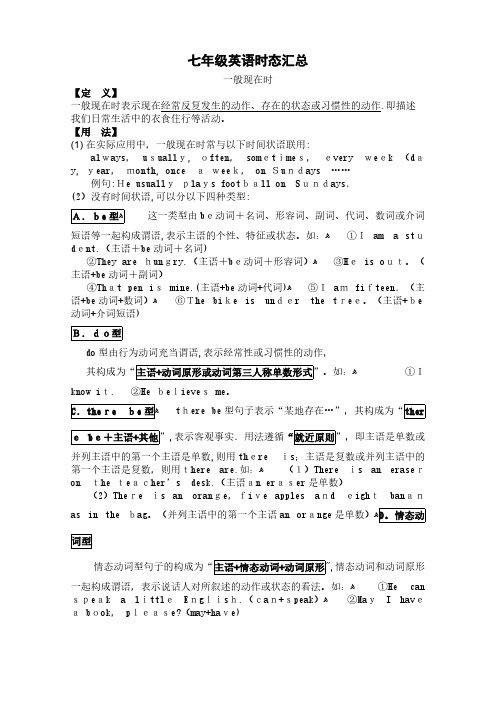
七年级英语时态汇总一般现在时【定 义】一般现在时表示现在经常反复发生的动作、存在的状态或习惯性的动作.即描述我们日常生活中的衣食住行等活动。
【用 法】(1)在实际应用中,一般现在时常与以下时间状语联用:always,usually, often,sometimes,every week (day, year,month, once aweek, on Sundays ……例句:He usuallyplays football on Sundays.(2)没有时间状语,可以分以下四种类型:A.be型ﻫ这一类型由be动词+名词、形容词、副词、代词、数词或介词短语等一起构成谓语,表示主语的个性、特征或状态。
如:ﻫ①Iam a student.(主语+be动词+名词)②They are hungry.(主语+be动词+形容词)ﻫ③He is out。
(主语+be动词+副词)④That pen is mine.(主语+be动词+代词)ﻫ⑤I am fifteen.(主语+be动词+数词)ﻫ⑥The bike is under the tree。
(主语+be动词+介词短语)B.do型do型由行为动词充当谓语,表示经常性或习惯性的动作,其构成为“主语+动词原形或动词第三人称单数形式”。
如:ﻫ ①I know it. ②He believes me。
C.there be型ﻫthere be型句子表示“某地存在…”,其构成为“ther ebe+主语+其他”,表示客观事实.用法遵循“就近原则”,即主语是单数或并列主语中的第一个主语是单数,则用there is;主语是复数或并列主语中的第一个主语是复数,则用there are.如:ﻫ (1)There is an eraseron the teacher’s desk.(主语an eraser是单数)(2)There is an orange,five apples and eight bananas in the bag。
2023年英语中考语法总复习—8.动词时态和语态
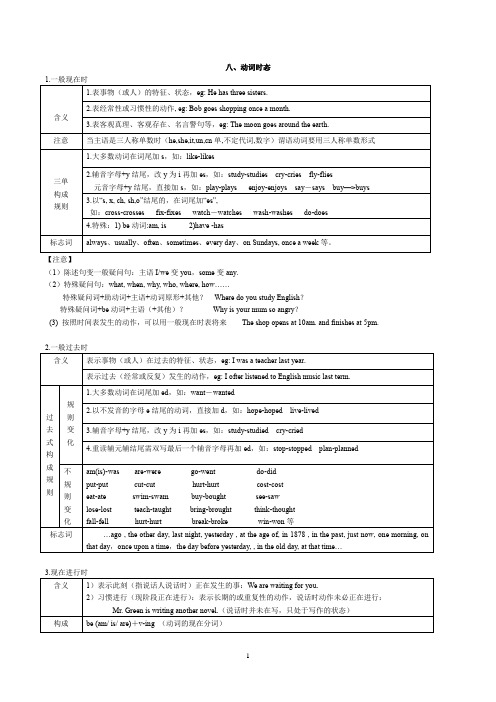
八、动词时态【注意】(1)陈述句变一般疑问句:主语I/we变you,some变any.(2)特殊疑问句:what, when, why, who, where, how……特殊疑问词+助动词+主语+动词原形+其他?Where do you study English?特殊疑问词+be动词+主语(+其他)?Why is your mum so angry?(3) 按照时间表发生的动作,可以用一般现在时表将来The shop opens at 10am. and finishes at 5pm.【注意】(1)always也可用于现在进行时,表示一种强烈的感情色彩,译为“总是”He is always telling lies.(2)某些特殊动词不能用于现在进行时。
① have当“有”讲时,不能用现在进行时。
I have two books now.②“belong to” The two people belong to me now.③表示“心理活动/状态/感觉”的词I want a dog now.① be going to主要用于:主观判断(1)表示事先经过考虑、安排好打算要做的事情:I’m going to play the violin.(2)表示根据目前某种迹象判断,某事非常有可能发生(有迹象表明要发生的事)。
Look!There come the dark clouds. It is going to rain.② will主要用于:(1)客观上将来势必发生的事情, 未经事先考虑, 临时决定的They will go to visit the factory tomorrow.(2)表示不以人的意志为转移的自然发展的未来的事:Today is Saturday. Tomorrow will be Sunday.(3)表意愿。
问对方是否愿意做某事或表示客气地邀请或命令:Will you please turn on the radio?(1) have/has been to “去过已回”She has been to Japan twice.have/has gone to. “去了未回”Where is your twin sister? She has gone to Japan.have/has been in “待在某地” She has been in Japan for 2 years. (2) 动词从词义上可以分为延续性和非延续性两种。
小学英语语法详解时态--—频率副词在一般现在时态中的使用、现在进行时
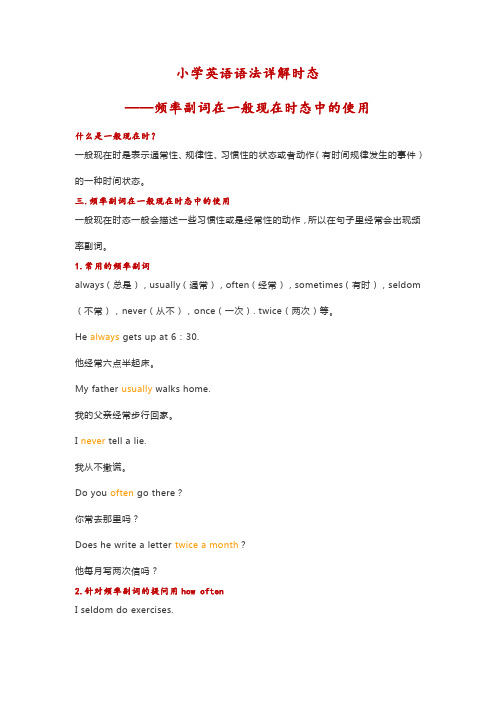
小学英语语法详解时态——频率副词在一般现在时态中的使用什么是一般现在时?一般现在时是表示通常性、规律性、习惯性的状态或者动作(有时间规律发生的事件)的一种时间状态。
三.频率副词在一般现在时态中的使用一般现在时态一般会描述一些习惯性或是经常性的动作,所以在句子里经常会出现频率副词。
1.常用的频率副词always(总是),usually(通常),often(经常),sometimes(有时),seldom (不常),never(从不),once(一次). twice(两次)等。
He always gets up at 6:30.他经常六点半起床。
My father usually walks home.我的父亲经常步行回家。
I never tell a lie.我从不撒谎。
Do you often go there?你常去那里吗?Does he write a letter twice a month?他每月写两次信吗?2.针对频率副词的提问用how oftenI seldom do exercises.我很少运动。
How often do you do exercises?你多久运动一次?Linda老师的小提醒频率副词一般放在动词之前,但有时频率副词也会放在句首,表示强调。
频率副词放在句首时,需用倒装句。
Sometimes she comes late.有时她来得晚。
Seldom does he go there.他很少去那里。
= He seldom goes there.小学英语语法详解时态——现在进行时什么是现在进行时?现在进行时表示现在正在进行着的事情。
Linda老师的小提醒现在进行时态,首先要注意的是“现在”——这件事情的发生不是过去,不是将来,而是现在(说话的当下)。
其次是“进行时”——也就是动作目前的状态是“正在进行中”。
而对于这件发生着的事情,究竟会发生多久,什么时候开始的,不需要考虑。
仁爱英语七年级现在进行时讲解
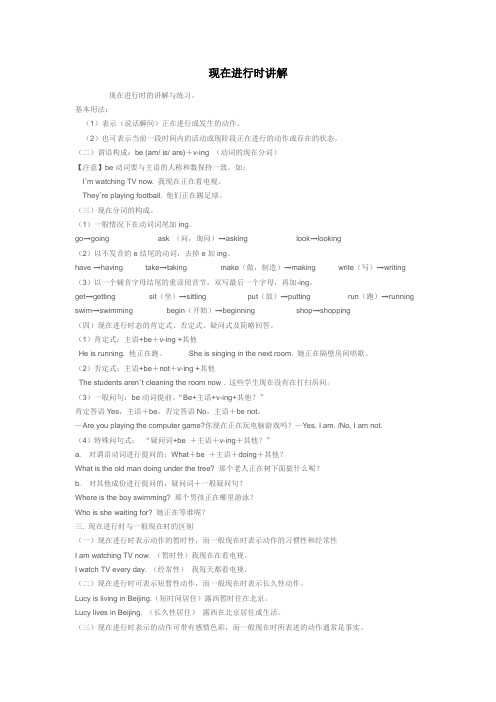
现在进行时讲解现在进行时的讲解与练习。
基本用法:(1)表示(说话瞬间)正在进行或发生的动作。
(2)也可表示当前一段时间内的活动或现阶段正在进行的动作或存在的状态。
(二)谓语构成:be (am/ is/ are)+v-ing (动词的现在分词)【注意】be动词要与主语的人称和数保持一致。
如:I’m watching TV now. 我现在正在看电视。
They’re playing football. 他们正在踢足球。
(三)现在分词的构成。
(1)一般情况下在动词词尾加ing。
go→going ask (问,询问)→asking look→looking(2)以不发音的e结尾的动词,去掉e加ing。
have →having take→taking make(做,制造)→making write(写)→writing (3)以一个辅音字母结尾的重读闭音节,双写最后一个字母,再加-ing。
get→getting sit(坐)→sitting put(放)→putting run(跑)→running swim→swimming begin(开始)→beginning shop→shopping(四)现在进行时态的肯定式、否定式、疑问式及简略回答。
(1)肯定式:主语+be+v-ing +其他He is running. 他正在跑。
She is singing in the next room. 她正在隔壁房间唱歌。
(2)否定式:主语+be+not+v-ing +其他The students aren’t cleaning the room now . 这些学生现在没有在打扫房间。
(3)一般问句:be动词提前。
“Be+主语+v-ing+其他?”肯定答语Yes,主语+be,否定答语No,主语+be not。
—Are you playing the computer game?你现在正在玩电脑游戏吗?—Yes, I am. /No, I am not.(4)特殊问句式:“疑问词+be +主语+v-ing+其他?”a. 对谓语动词进行提问的:What+be +主语+doing+其他?What is the old man doing under the tree? 那个老人正在树下面做什么呢?b. 对其他成份进行提问的,疑问词+一般疑问句?Where is the boy swimming? 那个男孩正在哪里游泳?Who is she waiting for? 她正在等谁呢?三. 现在进行时与一般现在时的区别(一)现在进行时表示动作的暂时性,而一般现在时表示动作的习惯性和经常性I am watching TV now. (暂时性)我现在在看电视。
初三英语时态汇总(一般现在时、一般将来时、一般过去时和现在进行时、过去进行时、现在完成时、过去完成时)
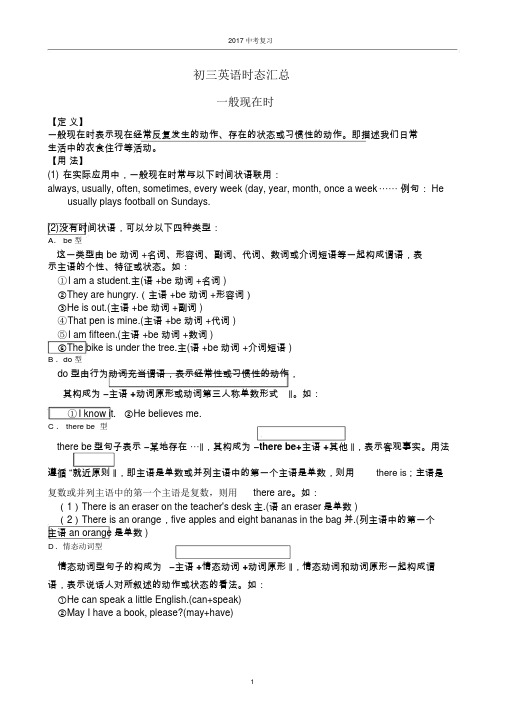
2017 中考复习初三英语时态汇总一般现在时【定义】一般现在时表示现在经常反复发生的动作、存在的状态或习惯性的动作。
即描述我们日常生活中的衣食住行等活动。
【用法】(1)在实际应用中,一般现在时常与以下时间状语联用:always, usually, often, sometimes, every week (day, year, month, once a week⋯⋯例句: He usually plays football on Sundays.(2)没有时间状语,可以分以下四种类型:A. be 型这一类型由 be 动词 +名词、形容词、副词、代词、数词或介词短语等一起构成谓语,表示主语的个性、特征或状态。
如:①I am a student.主(语 +be 动词 +名词 )②They are hungry.(主语 +be 动词 +形容词)③He is out.(主语 +be 动词 +副词 )④T hat pen is mine.(主语 +be 动词 +代词 )⑤I am fifteen.(主语 +be 动词 +数词 )⑥The bike is under the tree.主(语 +be 动词 +介词短语 )B .do 型do 型由行为动词充当谓语,表示经常性或习惯性的动作,其构成为―主语 +动词原形或动词第三人称单数形式‖。
如:①I know it. ②He believes me.C . there be型there be型句子表示―某地存在⋯‖,其构成为―there be+主语+其他‖,表示客观事实。
用法遵循“就近原则‖,即主语是单数或并列主语中的第一个主语是单数,则用there is;主语是复数或并列主语中的第一个主语是复数,则用there are。
如:(1)There is an eraser on the teacher's desk主.(语 an eraser是单数 )(2)There is an orange,five apples and eight bananas in the bag并.(列主语中的第一个主语 an orange是单数 )D.情态动词型情态动词型句子的构成为―主语+情态动词+动词原形‖,情态动词和动词原形一起构成谓语,表示说话人对所叙述的动作或状态的看法。
2023中考英语语法复习之考点专题——动词时态(原卷版)
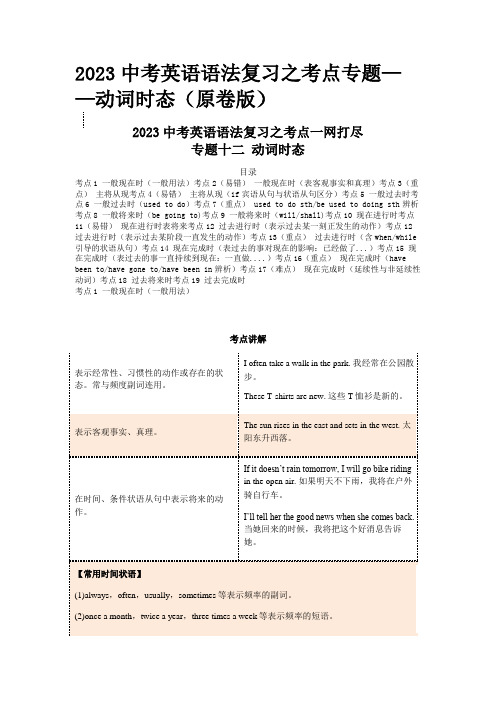
2023中考英语语法复习之考点专题——动词时态(原卷版)2023中考英语语法复习之考点一网打尽专题十二动词时态目录考点1 一般现在时(一般用法)考点2(易错)一般现在时(表客观事实和真理)考点3(重点)主将从现考点4(易错)主将从现(if宾语从句与状语从句区分)考点5 一般过去时考点6 一般过去时(used to do)考点7(重点) used to do sth/be used to doing sth辨析考点8 一般将来时(be going to)考点9 一般将来时(will/shall)考点10 现在进行时考点11(易错)现在进行时表将来考点12 过去进行时(表示过去某一刻正发生的动作)考点12 过去进行时(表示过去某阶段一直发生的动作)考点13(重点)过去进行时(含when/while 引导的状语从句)考点14 现在完成时(表过去的事对现在的影响:已经做了...)考点15 现在完成时(表过去的事一直持续到现在:一直做....)考点16(重点)现在完成时(have been to/have gone to/have been in辨析)考点17(难点)现在完成时(延续性与非延续性动词)考点18 过去将来时考点19 过去完成时考点1 一般现在时(一般用法)考点讲解1.(2021·上海松江·二模)Tim likes watching films. He _________ to the cinema with his girlfriend once a week.A.goes B.is going C.has gone D.will go2.(2020·湖北恩施)I hear that it often ________ in Sichuan and there are usually floods, especially in summer.A.rains B.rained C.will rain3.(2021·北京房山·二模)Mary ________ her grandparents every weekend.A.visits B.was visiting C.is visiting D.has visited4.(2021·广西桂林)The zebra eats grass, but it ________ eat meat.A.doesn’t B.didn’t C.don’t5.(2021·黑龙江·齐齐哈尔市碾子山区教师进修学校一模)—Do you like the flower? —Yes. It ________ sweet.A.is smelling B.smells C.smelt考点2(易错)一般现在时(表客观事实和真理)考点讲解精选练习6.(2020·天津红桥·二模)In the past, people didn't know the earth ________round the sun. A.going B.goes C.will go D.go7.(2021·吉林长春·模拟预测)The teacher told us that the sun ________ in the east. A.rises B.rise C.rose D.rising考点3(重点)主将从现考点讲解精选练习8.(2021·四川乐山)—What’s your plan for the summer holiday?—I’ll go to Chendu as soon as the school term ___________.A.end B.ends C.will end9.(2021·广西河池)Mrs. Green will take her son to the amusement park if she ________ the tickets.A.got B.gets C.is getting D.will get10.(2021·辽宁丹东)We can’t avoid traffic accidents unless everyone ________ the rules. A.follows B.breaks C.will follow D.will break考点4(易错)主将从现(if宾语从句与状语从句区分)考点讲解精选练习11.(2021·辽宁鞍山)—Tina wants to know if you ________ to the park with us tomorrow. —I’d love to. But if it ________, I may go to the library instead.A.go; will rain B.go; rains C.will go; rains D.will go; will rain12.(2020·黑龙江牡丹江)—I wonder if we ________a farewell party next week. —If we________it, I will call you.A.will have ; have B.have;will have C.will have; will have13.(2021·黑龙江哈尔滨)—I wonder if you ________ us for the English party tomorrow. —If I ________ free, I will go with you.A.will join, am B.will join, will be C.join, am考点5 一般过去时考点讲解精选练习14.(2021·广西贵港)—Where does Bill live? —He ________ me his address, but I can’t remember it now.A.tells B.told C.is telling D.will tell15.(2021·四川达州)— Alice has gone out. — Oh, has she? What time ________ she________?A.has; gone B.will; go C.did; go D.is; going16.(2021·江苏徐州)In my school days, I ________ a lot of reading in English every day. That was how I learned English at that time.A.do B.did C.have done D.will do17.(2021·重庆)Last Sunday my brother and I ________ our grandparents.A.will visit B.visits C.visit D.visited18.(2021·内蒙古兴安盟)— Have you ever been to Shanghai? — Of course. Actually, I________ there for six years, but now I live in Beijing.A.worked B.was working C.would work D.have worked考点6 一般过去时(used to do)考点讲解精选练习19.Mr Jiang isn’t as busy as before because there ___________no home robot to help him.A.used to be B.may be C.used to have D.may have20.I ________ in this small mountain village when I was a child.A.use to live B.used to living C.used to live D.used to life21.(2019·江苏镇江)Yao Ming, a basketball giant , ___________ water polo when he was young.A.is playing B.used to play C.is used to playing D.was playing考点7(重点) used to do sth/be used to doing sth辨析考点讲解精选练习22.(2020·湖南益阳)Diana used to _________ to work, but now she is used to ________ because the road is crowded and she wants to keep fit.A.drive; walk B.drive; walking C.driving; walk23.Dick __________ in America, but he has been ___________ Chinese food since he moved to China.A.used to live; used to eating B.is used to live; used to eat C.is used to live; used to eating D.used to living; used to eat24.—How does your brother go to school? —He ___________ ride a bike, but now he__________ there to keep fit.A.used to; is used to walk B.used to; is used for walking C.was used to; is used to walking D.used to; is used to walking考点8 一般将来时(be going to)考点讲解一般将来时表示将来某个时间要发生的动作,事情或存在的状态,也表示将来经常或反复发生的动作或事情。
初中英语语法——现在进行时知识点总结归纳

初中英语语法——现在进行时知识点总结归纳现在进行时是英语中的一种时态,表示现在正在进行或发生的动作。
在句子中,现在进行时由“be动词”(am, is, are)+动词的ing形式构成。
下面是现在进行时的一些基本知识点总结归纳。
1.现在进行时的构成:主语 + be动词(am/is/are) + 动词的ing形式2. be动词的变化:- 当主语是第一人称单数(I)时,be动词用am。
例如:I am playing soccer.- 当主语是第三人称单数(he/she/it)时,be动词用is。
例如:She is reading a book.- 当主语是第二人称单数(you)或所有人称(we/they)时,be动词用are。
例如:You are watching TV.3.现在进行时的用法:-表示现在正在进行的动作:例如:She is studying for her exam.-表示现阶段正在发生的变化或动作:例如:The weather is getting colder.-表示计划或安排的将来动作:例如:I am meeting my friends for dinner tonight.4.现在进行时的否定句和疑问句的构成:- 否定句:主语 + be动词 + not + 动词的ing形式例如:They are not playing basketball.- 疑问句:Be动词 + 主语 + 动词的ing形式?例如:Are you watching a movie?5.现在进行时与一般现在时的区别:-现在进行时强调动作的进行,往往与现在时间有关。
例如:I am studying for my exam. (强调现在正在进行的学习动作) -一般现在时表示经常性的动作或事实,不强调动作的进行。
例如:I study every day. (强调每天都进行的学习)6.现在进行时和时间状语的使用:-现在进行时常与现在连用,不需要使用时间状语。
英语现在进行时和一般现在时的区别

英语现在进行时和一般现在时的区别英语动词的时态时态和时间是两个不同的概念。
时间是一种客观存在的形式,它不依赖于任何一种特定的语言,为所有的文化共有。
时态是一种语言的手段,依语言的不同而有所区别,它是属于动词的语法范畴。
英语动词时态是以动词形式变化来表示句子中谈到的动作、状态的时间关系和说话的时间。
因此我们可以看到时态和时间两者间虽然有关系,但不可以混淆。
The plane leaves tomorrow morning. 飞机明晨起飞。
此句中的时态为一般现在时,但是它所表示的时间却为将来(明晨)英语动词的常用时态总共有十六种:一般现在时现在进行时一般过去时过去进行时一般将来时将来进行时现在完成时过去完成时将来完成时现在完成进行时过去完成进行时1.一般现在时一般现在时的形式是以动词的原形表示的,当主语为第三人称单数时,做谓语的动词原形后要加上词尾-s or –es, 其构成方式列表如下:情况构成例词一般情况词尾加-s Reads, writes以ch, sh, s, x, o结尾的词词尾加-es Teaches, washes, guesses, fixes, goes以辅音字母+Y 结尾的词变Y为I,再加-es Tries, carries但是,动词to be 和to have 的一般现在时的形式特殊如下:一般动词的词形变化To be 的词形变化To have 的词形变化I know it I am a student I have a pen.You know it. You are a student you have a penHe (she) knows it. He (she) is a student. He (she) has a pen.We (you, they) know it. We (you, they) are students. We (you, they) have pens.一般现在时的功用1. 表示一直发生的事情,经常发生的动作:Nurses look after patients in hospitals.Excuse me, do you speak English?I get up at 8 o’clock every morning.It often rains in summer in Beijing.2. 表示客观事实或者真理:Birds fly.The earth goes around the sun.3. 谈论时间表、旅程表等,如:What time does the film begin?The football match starts at 8 o’clock.Tomorrow is Thursday.4. 谈论籍贯、国籍等,如:Where do you come from?I come from China. 你是哪国人?我是中国人。
北师大版高一英语必修1_Unit1_Lesson1_语法精讲练:一般现在时和现在进行时
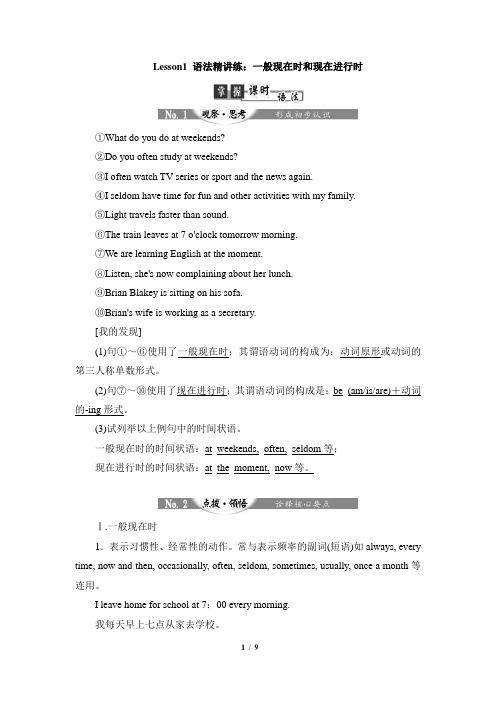
Lesson1 语法精讲练:一般现在时和现在进行时①What do you do at weekends?②Do you often study at weekends?③I often watch TV series or sport and the news again.④I seldom have time for fun and other activities with my family.⑤Light travels faster than sound.⑥The train leaves at 7 o'clock tomorrow morning.⑦We are learning English at the moment.⑧Listen, she's now complaining about her lunch.⑨Brian Blakey is sitting on his sofa.⑩Brian's wife is working as a secretary.[我的发现](1)句①~⑥使用了一般现在时;其谓语动词的构成为:动词原形或动词的第三人称单数形式。
(2)句⑦~⑩使用了现在进行时;其谓语动词的构成是:be_(am/is/are)+动词的-ing形式。
(3)试列举以上例句中的时间状语。
一般现在时的时间状语:at_weekends,_often,_seldom等;现在进行时的时间状语:at_the_moment,_now等。
Ⅰ.一般现在时1.表示习惯性、经常性的动作。
常与表示频率的副词(短语)如always, every time, now and then, occasionally, often, seldom, sometimes, usually, once a month等连用。
I leave home for school at 7:00 every morning.我每天早上七点从家去学校。
小升初小学英语语法总复习现在进行时一般现在时

wash finish
washes finishes
catch
go do
catches
goes does
If the verb ends in -y, we have to change the letter y into ies.
tidy study
tidies studies
carries
carry
Do Does
I/you/we/they He/she/it
do?
e.g. Do you sing? e.g. Does Sam eat fish?
Now you try.
____ he sweep the floor? Does
Do you water the plants? ____
_____ you make the bed? Do
doesn’t like sweets. e.g. I like sweets. She ____________ 1 She runs fast. I ____________ don’t run fast.
Now you try
doesn’t play 2 Paul plays football but he ____________ basketball.
need to change the verb.
He waters the plants every day. She walks the dog every day. My mum cooks us dinner every day.
When we talk about a third person (he/she/it/名单),
现在进行时的含义与构成
新目标人教七年级下册英语期中考试知识点和语法总结
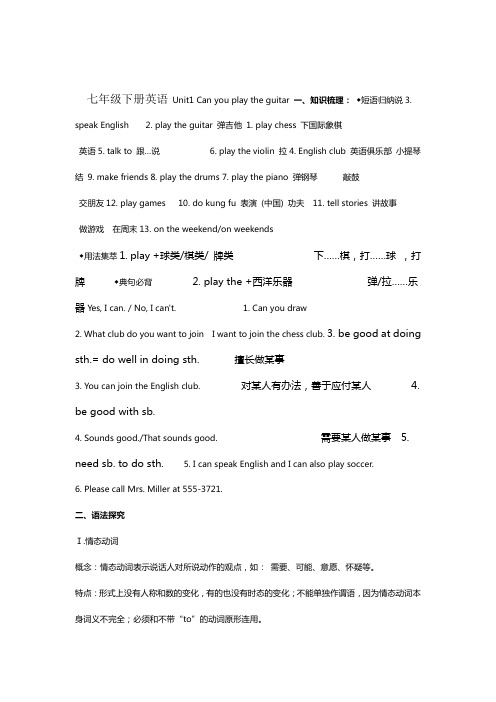
七年级下册英语Unit1 Can you play the guitar一、知识梳理:◆短语归纳说3. speak English 2. play the guitar 弹吉他1. play chess 下国际象棋英语5. talk to 跟…说 6. play the violin 拉4. English club 英语俱乐部小提琴结9. make friends 8. play the drums 7. play the piano 弹钢琴敲鼓交朋友12. play games 10. do kung fu 表演(中国) 功夫11. tell stories 讲故事做游戏在周末13. on the weekend/on weekends◆用法集萃1. play +球类/棋类/ 牌类下……棋,打……球,打牌◆典句必背 2. play the +西洋乐器弹/拉……乐器Yes, I can. / No, I can't. 1. Can you draw2. What club do you want to join I want to join the chess club.3. be good at doing sth.= do well in doing sth. 擅长做某事3. You can join the English club. 对某人有办法,善于应付某人4. be good with sb.4. Sounds good./That sounds good. 需要某人做某事5. need sb. to do sth. 5. I can speak English and I can also play soccer.6. Please call Mrs. Miller at 555-3721.二、语法探究Ⅰ.情态动词概念:情态动词表示说话人对所说动作的观点,如:需要、可能、意愿、怀疑等。
5年级英语现在进行时与一般现在时态
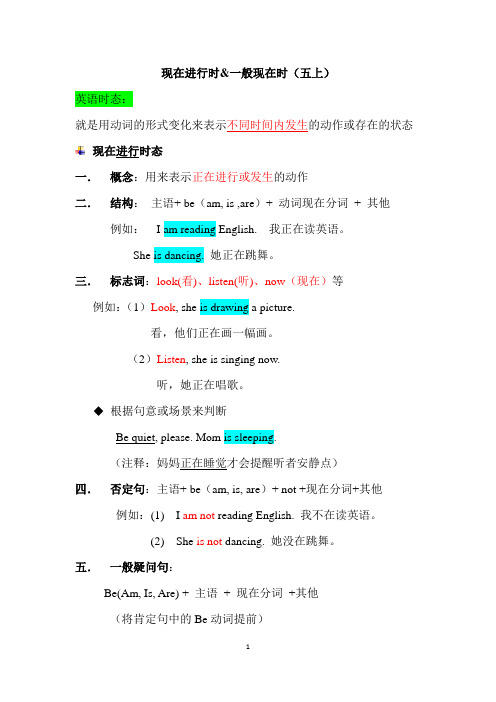
现在进行时&一般现在时(五上)英语时态:就是用动词的形式变化来表示不同时间内发生的动作或存在的状态现在进行时态一.概念:用来表示正在进行或发生的动作二.结构:主语+ be(am, is ,are)+ 动词现在分词+ 其他例如:I am reading English. 我正在读英语。
She is dancing. 她正在跳舞。
三.标志词:look(看)、listen(听)、now(现在)等例如:(1)Look, she is drawing a picture.看,他们正在画一幅画。
(2)Listen, she is singing now.听,她正在唱歌。
根据句意或场景来判断Be quiet, please. Mom is sleeping.(注释:妈妈正在睡觉才会提醒听者安静点)四.否定句:主语+ be(am, is, are)+ not +现在分词+其他例如:(1) I am not reading English. 我不在读英语。
(2) She is not dancing. 她没在跳舞。
五.一般疑问句:Be(Am, Is, Are) + 主语+ 现在分词+其他(将肯定句中的Be动词提前)例:—Are you reading English? 你正在读英语吗?—Yes, I am. 是的,我是在读英语。
—No, I’m not. 不,我没在读英语。
六.特殊疑问句:结构:特殊疑问词+ 一般疑问句例:- What are you doing? 你正在做什么?-I’m reading English. 我正在读英语。
七.现在分词的变化规则1.一般情况下,直接在动词后面加ing,如:read __ reading cook __ cooking2.以不发音字母e结尾,则去掉e,再加ing如dance ___ dancing take ___ taking3.如果动词只有一个元音字母,且末尾只有一个辅音字母时,双写词尾,再加ing如:put ___ putting run__ running sit ___ sittingget ___ getting stop ___ stopping一般现在时一.概念:通常表示经常发生的动作或存在的状态。
初中英语时态一般现在时-现在进行时-一般过去时-过去进行时
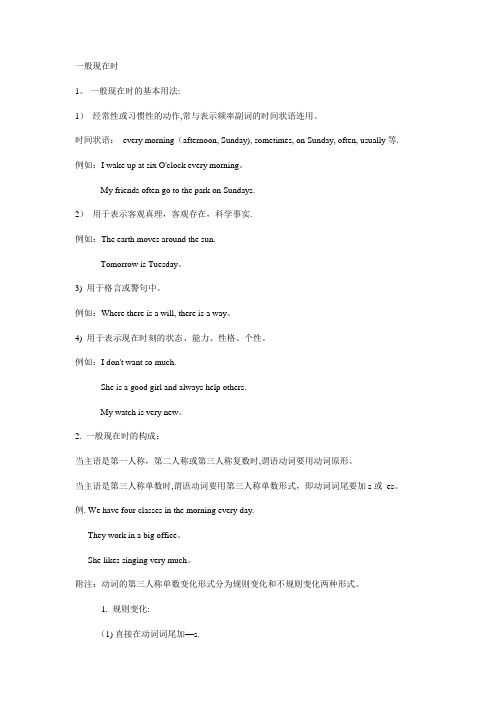
一般现在时1。
一般现在时的基本用法:1)经常性或习惯性的动作,常与表示频率副词的时间状语连用。
时间状语:every morning(afternoon, Sunday), sometimes, on Sunday, often, usually等. 例如:I wake up at six O'clock every morning。
My friends often go to the park on Sundays.2)用于表示客观真理,客观存在,科学事实.例如:The earth moves around the sun.Tomorrow is Tuesday。
3) 用于格言或警句中。
例如:Where there is a will, there is a way。
4) 用于表示现在时刻的状态、能力、性格、个性。
例如:I don't want so much.She is a good girl and always help others.My watch is very new。
2. 一般现在时的构成:当主语是第一人称,第二人称或第三人称复数时,谓语动词要用动词原形。
当主语是第三人称单数时,谓语动词要用第三人称单数形式,即动词词尾要加s或es。
例. We have four classes in the morning every day.They work in a big office。
She likes singing very much。
附注:动词的第三人称单数变化形式分为规则变化和不规则变化两种形式。
1. 规则变化:(1) 直接在动词词尾加—s.ask---asks work--—works get———gets stay--—stays(2) 以字母s,x, ch, sh或o结尾的动词,在词尾直接加-es。
fix—--fixes do—--does go--—goes pass——-passeswatch——-watches wash____washes(3)以“辅音字母加“y"结尾的动词,要先变y为i再加-es。
动词时态讲义:现在进行时与一般现在时表将来的特点与区别知识点总结-高考英语语法复习学习专题

高中英语语法高考复习/学习专题讲义英语动词时态现在进行时与一般现在时表将来的特点与区别知识点总结现在进行时表将来有哪些特点1.用现在进行时表将来通常含有“意图”“安排”“打算”等义。
这种现在进行时比较生动,给人一种期待感,通常用于表最近或较近的将来,所用动词通常表示位置移动的动词。
如:Annie is coming to supper this evening. 安妮今晚要来吃饭。
I’m going to Shanghai tomorrow.我明天要去上海。
The guest is leaving by train tonight. 客人今晚坐火车走。
The boys are starting school on Monday. 男孩子们星期一就要开学了。
2.表将来的现在进行时除用于转移动词外,有时也可用于某些非移动动词。
如:Bob and Bill are meeting tonight. 鲍勃和比尔今晚要会面。
What are you doing next weekend? 下个周末你准备干什么?She is buying a new bike soon. 她不久将买一辆新自行车。
We are having a few guests tonight. 今晚我们有几个客人来。
I am reading a paper tomorrow. 我明天要读一篇论文。
3. 用现在进行时表将来偶尔也可表示较远的将来。
如:When I grow up, I’m joining the army.我长大了要参军。
4. 现在进行时有时表示即将要发生的动作或情况。
如:I’m leaving. 我就走。
Hurry up, it’s already very late.—OK, I’m coming. 快点,已经很晚了。
——好的,我就来。
Where are the boys? 一They’re coming. 小伙子们呢? ——他们马上就来。
小学英语语法测验(一般现在时与现在进行时)
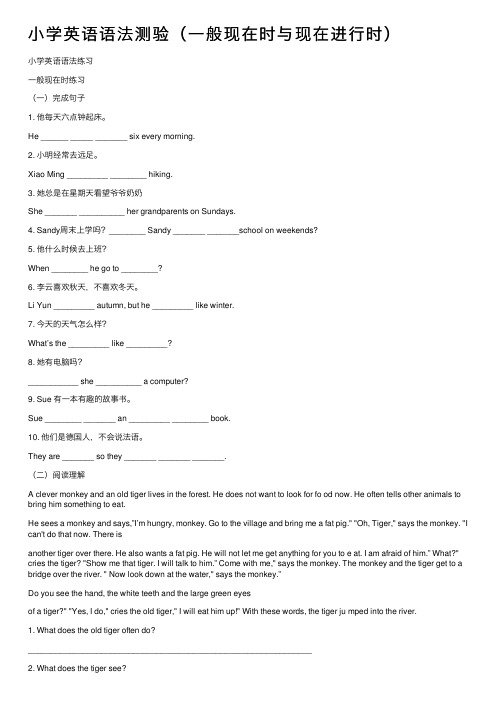
⼩学英语语法测验(⼀般现在时与现在进⾏时)⼩学英语语法练习⼀般现在时练习(⼀)完成句⼦1. 他每天六点钟起床。
He ______ _____ _______ six every morning.2. ⼩明经常去远⾜。
Xiao Ming _________ ________ hiking.3. 她总是在星期天看望爷爷奶奶She _______ __________ her grandparents on Sundays.4. Sandy周末上学吗?________ Sandy _______ _______school on weekends?5. 他什么时候去上班?When ________ he go to ________?6. 李云喜欢秋天,不喜欢冬天。
Li Yun _________ autumn, but he _________ like winter.7. 今天的天⽓怎么样?What’s the _________ like _________?8. 她有电脑吗?___________ she __________ a computer?9. Sue 有⼀本有趣的故事书。
Sue ________ _______ an _________ ________ book.10. 他们是德国⼈,不会说法语。
They are _______ so they _______ _______ _______.(⼆)阅读理解A clever monkey and an old tiger lives in the forest. He does not want to look for fo od now. He often tells other animals to bring him something to eat.He sees a monkey and says,”I’m hungry, monkey. Go to the village and bring me a fat pig." "Oh, Tiger," says the monkey. "I can't do that now. There isanother tiger over there. He also wants a fat pig. He will not let me get anything for you to e at. I am afraid of him.” What?" cries the tiger? "Show me that tiger. I will talk to him.” Come with me," says the monkey. The monkey and the tiger get to a bridge over the river. " Now look down at the water," says the monkey.”Do you see the hand, the white teeth and the large green eyesof a tiger?" "Yes, I do," cries the old tiger," I will eat him up!" With these words, the tiger ju mped into the river.1. What does the old tiger often do?______________________________________________________________ 3. Is there another tiger in the forest?______________________________________________________________⼀般现在时⼀、选择填空1、When summer_______, some children will go to the seaside for fun.A. comesB. cameC. will comeD. would come2. Tom is strong and he________ to school every day.A. walked B walks C. will walk D. has walked3. Sometimes she___________ to me on Sundays.A. callB. is callingC. callsD. will call4. Jenny is a nurse and __________ in Town Hospital.A. worksB. workC. worked D had worked5. My mother usually __________ up at 5:30 in the morning.A. getB. gotC. will getD. gets6. The twin sisters _________ football.A don’t likeB doesn’t likeC not likeD aren’t like7. —Where_________ you come from? —I ______ from China.A are; amD do; do8. Sandy’s _______ a model plane in her room.A findB makeC makesD making9. I _______ all your names.A do knowB don’t knowC doesn’tD knows10. We ________ lessons on Sunday.A don’t haveB didn’t have aC has noD hasn’t no11. She _______ her laptop ________ her lessons.A use; forB with; forC uses; ofD uses; for12._________ the elephant ________ in the froest?A Is; workB Does; workC Do; workD Does; working13. He often________ dinner at his grandparents’ home.A eatB haveC hasD cook14.—________ I borrow your ruler? —Sorry, you can’t.I’m using now.A Can15.—_______ What does she ______ Tony? —Nothing.A. says to B say to C. tell to D. tells16.Do you know he _______ English every morning?A. readB. readingC. is readingD. reads17. Does Amy ______ music?A. likes listening toB. like listeningC. like listening toD. likes to listening to18. Tommy wants to know what Millie _______ a school day.A. do onB. does inC. do inD. does on19.—_______ Sandy and her sister like walking together? —Yes, _______ do.A. Do; theyB. Does; theyC. Can; theyD. Do; we20.________ the woman_______ English ?A. Does; speakB. Does; teachC. Does; teachesD.A and B⼆、从括号中选词填空,完成句⼦。
